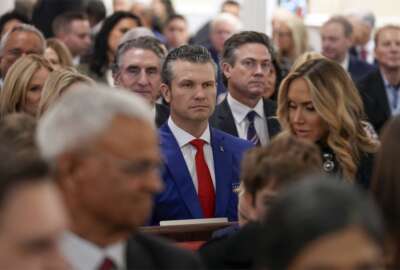Examining the ecosystem that supports military installations
Defense installations often have mutually beneficial relationships with the communities that surround them. Communities can be both social and economic.
Defense installations often have mutually beneficial relationships with the communities that surround them. Communities can be both social and economic. They have even got their own group: The Association of Defense Communities. To ask about the top issues facing these communities, the Federal Drive with Tom Temin spoke with the association’s Executive Director, Matt Borron.
Interview Transcript:
Tom Temin I confess, this is the first time I’ve known about this association, and I thought I knew all the ones in Washington, but there’s plenty out there. What does this association do? What’s what is the goal here?
Matt Borron ADC has been around for about 50 years. We actually got our start back in the day when DoD started closing bases. And this was really before they even had to ask Congress for permission so they could literally padlock the gate and throw the community the key and say, good luck. And they did that, as you know. And even then, when Congress got involved with the Base Realignment and Closure around the 90s and the last 1 in 2005. But, when they first started this some 50 years ago, some communities where this had happened, where they’d lost their base, they got together and they said, really, what do we do now? How do we recover from losing x thousand amount of jobs kind of overnight? And so for probably the first half of our existence, that’s who we were. We were these communities grappling with economic redevelopment and environmental clean up and reuse and redevelopment issues, kind of all of that awful stuff. But if you fast forward to today, our membership is almost entirely consistent of communities that host active military bases. And it’s organizational base membership. So sometimes it’s a city, sometimes it’s a county. A lot of times it could be a chamber of commerce or a standalone defense alliance. But really, it’s whichever organization they’re at the local level that has come to take the lead when it comes to installation, military advocacy and partnership work.
Tom Temin It seems like local acquisition is important because so much of defense acquisition is done centrally or by the big commands for the local installations, and things gets shipped out through various means. But there’s also, I guess, important local contracting that can happen for a base that members try to encourage.
Matt Borron Absolutely. At the end of the day, our members look at their installation through an economic development lens. In most cases, it’s the largest economic engine they’re, thousands of workers. And the kind of the waterfall effects of where they live and service members and their families live off base. 70% or so. It really is through that lens and our members, do everything we can to prop up the defense sector. So whether it’s land use or encroachment mitigation, that’s a lot of workforce development. It’s a lot of infrastructure, roads, utilities all these things that the base relies on. More recently it’s been quality of life.
Tom Temin What are the top quality of life issues for military members? I mean housing comes up, but that’s a localized issue. What are some of them.
Matt Borron And that’s that’s really kind of the the meat of it, is all of these quality of life issues are local and they are all kind of different. Housing, child care, spouse employment is a huge one. Military spouses have some of the highest unemployment in the country. And it’s related to moves and constantly having to find new employers. But you see a lot of things, military child education now. And so, like you said, housing on the list kind of seems to grow every day.
Tom Temin Yes. So can members of the association, the local counties or the states or whoever, again, is surrounding that community? It seems one of the issues that comes up is just simply recognizing a licensed trade from one area and honoring that when the spouse moves with the service member to another state or local.
Matt Borron Licensure and reciprocity is has been a huge issue. And you’re absolutely right. If I’m a teacher, can I have a teacher’s license in one state? Does it apply to the other state? And it goes down. It can be beauticians. It can be, lawyers and nurses, you kind of name it. And states have really tried to address that, but it hasn’t been easy. All of these different professions kind of have their own licensure silos, if you will, within their states. So it’s been a lot of coordination. And we have something we call the State Advisors Council. Most states now have an organization at the state level that is responsible for military affairs for work. And so by coordinating that, you’ve seen a lot of states now passed legislation kind of providing that blanket, reciprocity for these.
Tom Temin We’re speaking with Matt Borron. He is executive director of the Association of Defense Communities. And you also have a conference annually. And what kinds of things get discussed there. And looks like you have a pretty good lineup of congressional members speaking.
Matt Borron It’s amazing how connected our communities can be to their congressional delegations. Again, installations and military issues are one of the things that could bring us together still in a lot of cases in a bipartisan way. So we do have a good robust caucus on the House and the Senate side. And our national summit next week is really our event and our opportunity to bring all of our communities together and really kind of press Congress and DoD and talk about the issues that are important to us.
Tom Temin Now, [Base Realignment and Closure (BRAC)] as a process seems to be a thing of the past, even though it’s statutorily there in the toolbox. But Congress just never actually gets started anymore. So what do you expect in terms of the line up in the population of bases and installations in the future?
Matt Borron BRAC is a four letter word, and I think it only comes up when you’re talking to a lobbyist. But I don’t foresee a BRAC round anytime in the near future. If anything, our communities aren’t worried about losing their bases any more. They’re worried about growing. How do they attract the next F-35 mission? Or how do they get a piece of Space Force? How can they grow their defense sector at the local level? So the issues that we’ll talk about are creating new authorities by which communities and bases can partner on a full range of issues, whether it’s infrastructure or quality of life. We’ve been very successful in getting some of those programs created within DoD.
Tom Temin And what about the civilian workforce that is in all of these installations? That’s a group of people that tend to stay put relative to the service members on active duty that come and go and the rotation in and out there is probably a whole different set of people every two years or so. What are some of the issues connected to the civilian workforce, which is a little bit more permanent, if you will, in a given spot?
Matt Borron Well, honestly, a lot of times the civilian workforce is that that continuity. So these partnerships that are created when, like you said, a base commander comes and goes every 2 or 3 years, who maintains the inter-governmental support agreements, or the sharing of services and facility maintenance costs. And often that’s the civilian workforce. But a lot of times they have kind of specialized needs as well. And communities are really looking at how do they grow with that workforce. What are the types of workforce development programs can they put in place, not just for adults, but even at the high school level? The state of Arkansas has done some really interesting program at the high school there where they partnered with the base, and they now have a two semester long cybersecurity and coding course. They teach at the high school, and it’s taught by uniformed personnel. And these are just the types of programs that, whether you’re in uniform or not, can really help drive partnership at the local level.
Tom Temin Sounds like there’s a lot of idea sharing among members from all over the country.
Matt Borron And that’s really the goal of ADC. At the end of the day, our mission is education and connection.
Copyright © 2025 Federal News Network. All rights reserved. This website is not intended for users located within the European Economic Area.
Tom Temin is host of the Federal Drive and has been providing insight on federal technology and management issues for more than 30 years.
Follow @tteminWFED







